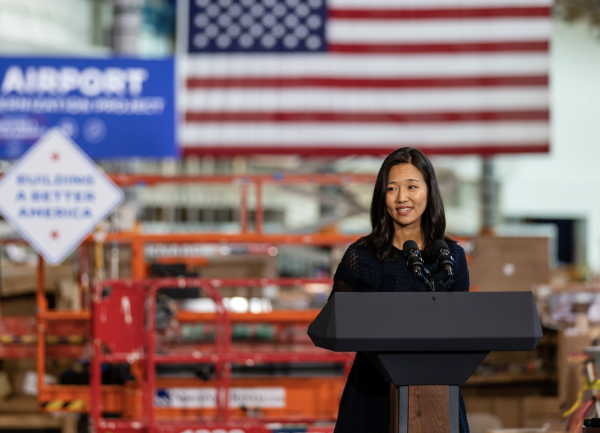September 13, 2022

Mayor Wu speaks at an event with President Biden in East Boston on Monday. (Mayor's Office photo)
City Hall plans to challenge the US Census Bureau’s population count for Boston, saying the federal effort missed college students and the foreign-born population, as well as people inside correctional facilities.
Mayor Michelle Wu said city officials also object to federal racial and ethnic classification changes for the 2020 census, which took place during the pandemic. An accurate count helps determine federal funding for city programs.
“Boston deserves an accurate census count across every neighborhood and community,” Wu said in a statement. “This count is the foundation to assess the needs of all of our communities, ensuring that Boston receives crucial federal resources, and it should reflect our full numbers.”
The Census says Boston’s population grew 9.4 percent between 2010 and 2020. The 2020 total was 675,647, with the city adding Hispanic and Asian residents. The non-Hispanic Black/African American population fell 6.4 percent.
In October 2021, acting Mayor Kim Janey said the city planned to formally challenge the count. Allston-Brighton City Councillor Liz Breadon also raised alarm about the Census estimate showing a 5.9 percent loss in Allston’s total population, and a 40 percent decline in people living in groups, noting that the pandemic led to colleges and universities sending students away.
RELATED: Dot leads gains in neighborhoods Mattapan sees small rise; loss in Black numbers
Councillor At-Large Ruthzee Louijeune said her office previously met with the Wu administration to press for the challenge.
“An accurate count of Boston residents will ensure that all our communities, especially our Black & Brown communities that have suffered from decades of disinvestment, get the resources and attention needed to thrive,” she said. “Additionally, the US Census Bureau must respect how people identify themselves racially and ethnically. The Census must consider simplifying categorizations, particularly for Latino, Brazilian, Middle Eastern, and North African respondents, to correctly capture our demographics.”
Census tracts with foreign-born residents had lower response rates, city officials said, suggesting that language barriers and government mistrust, driven by the anti-immigrant Trump administration’s push for a citizenship question, helped in a potential undercount.
The Wu administration also pointed to the reclassification of race and ethnicity data.
“As a result of this Census coding, 76 percent of Hispanics in Boston chose (or were assigned) the “some other race” category, either by itself or in addition to other racial categories, up from 45 percent of Hispanics in 2010,” the administration said in a release. “Additionally, respondents listing Brazilian or Cape Verdean origin were reassigned by the US Census Bureau to the “some other race” and respondents that stated a Middle Eastern or North African origin were assigned to the White category respectively.”
The late Mayor Thomas Menino repeatedly challenged census population estimates. In 2009, the fourth year in a row he did so, Menino said Boston was undercounted by 21,000 people. It came after the Census bureau revised the 2008 estimate to 609,023, putting the city over the 600,000 mark for the first time since the 1970s.


